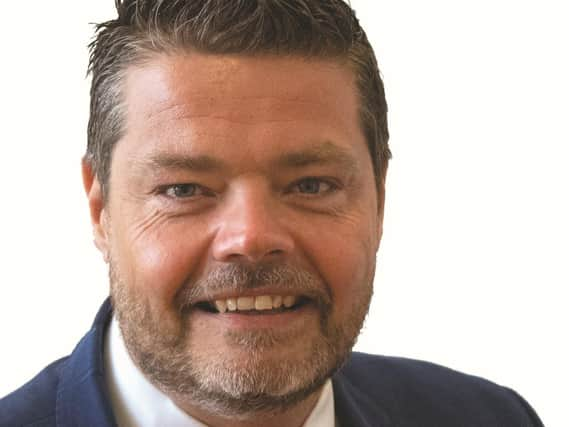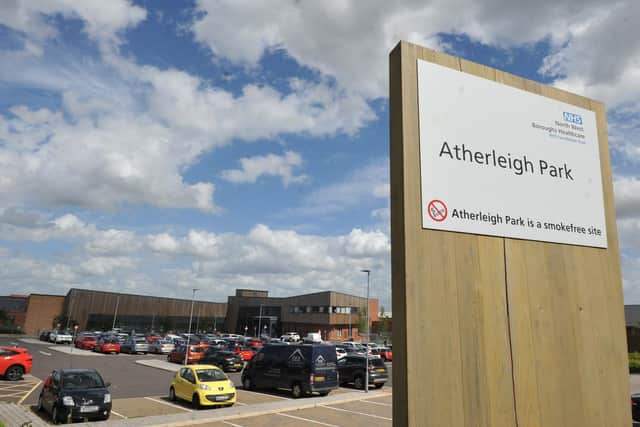Wigan mental health services struggling to cope in pandemic


John Heritage, chief operating officer of North West Boroughs Healthcare NHS Foundation Trust, was speaking after the Wigan Observer was contacted by readers reporting that borough patients were enduring the indignity of having to sleep overnight in Atherleigh Park Hospital’s glass-fronted reception area because of a shortage of beds.
And another told the paper that staff morale was “rock bottom” with some going off ill with the pressure of it all and others were coming home in work in tears.
Advertisement
Hide AdAdvertisement
Hide AdMr Heritage said he was aware of the pressures that were being put on employees and said the trust was working with partner organisation to spread the workload as best as possible. He stressed that the problems are being replicated in trusts across the country as coronavirus and the lockdowns it spawned create a surge in mental health issues.


One caller, who wished to remain anonymous, said: “A close relative of mine works at Atherleigh Park and she comes home shattered and often very upset.
“There are just too many patients and the hospital can’t cope. Colleagues have been going off sick and of course that only serves to make things worse. She would like to do that too but she is too caring and conscientious so she soldiers on. Morale is rock bottom because there is so much to do and not enough people and facilities to cope.”
Another said: “There is such a chronic bed shortage at Atherleigh Park that my friend had to sleep overnight in the reception area. She wasn’t alone either. Plenty others have had to do this too.
Advertisement
Hide AdAdvertisement
Hide Ad“It’s a glass-fronted building so there’s no privacy. It’s hard enough going to a hospital for mental health issues without being subjected to that indignity as well. She was there for 36 hours and a bed couldn’t be provided so she left.
“I can imagine that other people might walk away after an experience like that and then they might do harm to themselves because they weren’t able to get the treatment they needed.”
Mr Heritage said that the hospital was not turning any patients away but acknowledged that it was confronted by patient numbers and problems of a size never before seen.
He said: “The increased demand for mental health services we are experiencing is unprecedented.
Advertisement
Hide AdAdvertisement
Hide Ad“Perhaps not surprisingly, the impacts of this year’s Covid-19 pandemic on people’s mental wellbeing have been significant and we’re now starting to see the results of that, with more people finding themselves in a mental health crisis.
“And it isn’t just an increase in numbers; we’re also seeing an increase in the complexity of people’s needs, with many very poorly people requiring more intense care and longer treatment.
“We know this isn’t unique to Wigan or our trust. Mental health providers across the country are experiencing similar challenges, with further increases predicted.
“I’m being completely honest when I say this is incredibly difficult to manage and our services are struggling to always provide the level of care we aspire to.
Advertisement
Hide AdAdvertisement
Hide Ad“Our first priority is delivering safe and effective services, but, as a result of the significant increase in demand for our services in Wigan, we are facing real challenges in being able to respond in the timeframes we would want to.
“We are working alongside our health and care partners and commissioners across the Healthier Wigan Partnership to find ways of making sure that happens.
“We are prioritising urgent treatment and have already moved staff from other roles to increase capacity.
“We have invested in additional staff, including 15 assistant psychologists, to meet the demand and are advertising for more people to join us at the moment.
Advertisement
Hide AdAdvertisement
Hide Ad“We’re making use of nurses from Wrightington, Wigan and Leigh to support with physical health checks, freeing up our mental health nurses to focus on mental health care. We will be supporting GPs across the borough to better respond to mental health needs by offering dedicated mental health expertise.
“We have also made arrangements to increase the number of mental health beds our patients have access to.
“We are also exploring ways the local voluntary and community sector can become more involved with providing non-urgent mental health therapies to take the pressure off and we’re working with our partners to secure funding to bring forward plans to create a multipurpose crisis cafe at Atherleigh Park where people can receive informal support with their mental health, drug and alcohol needs, debts, housing and other concerns.
“We are very aware this situation is putting pressure on our brilliant staff who have done a phenomenal job before and during the Covid-19 pandemic and continue to do now.
Advertisement
Hide AdAdvertisement
Hide Ad“I have been overwhelmed by the care, compassion, determination and resilience they demonstrate. We take staff wellbeing very seriously and have developed a staff wellbeing hub offering enhanced psychological support and practical tips and advice to help people cope during these very challenging times. This is in addition to the support provided locally by our leadership team in Wigan.
“One area we must highlight is the importance of early intervention. If people are able to recognise the signs of mental ill health and seek help early, they are more likely to be able to access appropriate treatment in the community, preventing them from reaching crisis point.
“People are much more aware of their mental wellbeing now than in years gone by, but it can still be confusing to know how and when to seek help. The same as with symptoms of physical ill health, it’s vital people don’t ignore early signs and seek help at the right time and in the right way.
“We have an extensive health and wellbeing section on our website (www.nwbh.nhs.uk) which helps people identify signs of common mental health conditions such as anxiety and depression. It also offers tips and advice for improving self-care. If symptoms persist, please contact your GP in the first instance. They will be able to assess whether you need to be referred for further advice or treatment.
Advertisement
Hide AdAdvertisement
Hide Ad“Most importantly, if you feel you or someone you love is in a mental health crisis, do not hesitate to call our 24-hour crisis line on 0800 051 3253, where you will speak to an experienced mental health professional.”